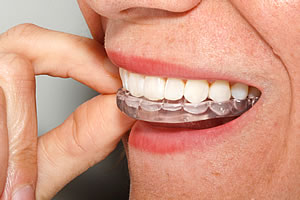Bruxism Definition
Bruxism is also known as grinding and/or clenching of your teeth. It’s a very common condition that affects approximately 30 million to 40 million children and adults in the U.S
Signs & Symptoms
If you notice any of the following symptoms, you may be experiencing bruxism:
- Rhythmic contractions of the jaw muscles
- A grinding sound at night, which may disturb the sleep of someone who you share a room with
- Jaw muscles that are tight or painful
- Popping or clicking of the temporomandibular joint
- Long-lasting pain in the face
- Damaged teeth, broken dental fillings and injured gums
- Headache
- Swelling (occasionally) on the side of your lower jaw caused by clenching
Cause
Some experts consider bruxism to be a habit, while others attribute it to one of the following:
- Stress, anxiety, frustration and anger
- A malocclusion, or when the teeth and jaw do not line up correctly
- A symptom of certain rare diseases of the nerves and muscles in the face
- In rare cases, it may be a side effect of some medicines that treat depression. These include Prozac (fluoxetine), Zoloft (sertraline) and Paxil (paroxetine).
- A complication of Huntington or Parkinson’s disease
Treatment
The simplest solution is to use a professionally made night guard, which prevents the teeth from scraping against each other while you sleep. Your dentist may also have to restore damaged teeth with fillings or crowns to maintain the proper shape and size of the teeth.

 818-706-0975
818-706-0975 
